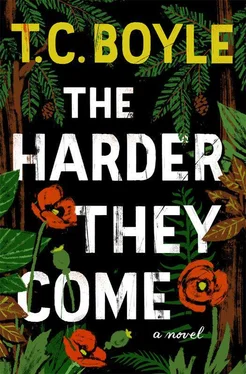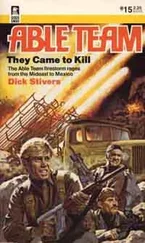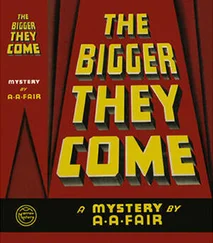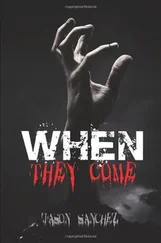What woke him was his sixth sense. He heard the rain, heavy now, sizzling like the deep fryer at McDonald’s, and something else, an automotive noise, but the wheel inside him was barely turning at all and the vodka seemed to just press down on him till he felt like a deep-sea diver in one of those old-fashioned deep-sea suits with the riveted helmet and the long trailing air hose that seemed to rise up into infinity. It wasn’t weakness and it wasn’t the vodka, or not exactly, and it wasn’t the warmth of the woodstove or the fact that he could have lived in this cabin himself, all by himself, and built a wall around it too. . it was just that he was feeling cool, equal to anything, and he was just waiting to see who or what was coming through that door because he had a sawed-off.22 in his hand that was just like a pistol, that he could use as a pistol in any tight place, and a box of shells for it too that was just lying there in the drawer of the coffee table next to a deck of cards that had been thumbed through so many times the lamination was practically worn right off each and every one of them. And he’d looked. He had. And saw that the deck was missing the ace of diamonds — not the ace of spades, the ace of diamonds — and what that meant or didn’t mean he couldn’t say. He wasn’t superstitious. Or maybe he was.
Footsteps on the porch. Key in the lock. And there she was, an old lady with white hair and a what’s-up face who could have been his grandmother if his grandmother wasn’t dead already and buried and probably being dug up at that very minute by Art Tolleson, whoever he was or turned out to be when you peeled his mask off. It took her a minute, hanging there in the doorway as if she couldn’t decide whether to stay or go, the rain hanging like a gray sheet behind her and smelling of release and new life for the plants, the animals, the gullies and creeks and rivers. “Who are you ?” she asked and before he could answer asked what he was doing there. Or what he thought he was doing there.
The door stood open. The old lady had three plastic bags of groceries dangling from her purple-veined hands. Her hair was wet on top and two long strands of it, one on either side of her puzzled face, were plastered wet to the skin there. “Who am I?” he said. “I’m Colter. What was the second question again?”
The rain sizzled behind her. It was really coming down, a real worm-washer. She didn’t seem to have heard him. She just stood there, the bags dangling. “What are you doing in my house?” That was what she wanted to know, and if there was an edge to her voice now, that was because she’d begun to take in the scene, the open window, the vodka, the fire, the metal shavings on the floor and the vise he’d clamped to the edge of the coffee table to steady the blade. And the guns: his rifle, propped up against the armchair with the dog hair on it, and the modified.22 he held in his hand. Which used to be a rifle. And used to be hers.
She deserved an answer and he felt so lazy and peaceful and calm he decided to give her one — and to be as pleasant about it as he could too. “Enjoying your hospitality,” was what he said, even as another sound entered the mix, the rattle of a dog’s toenails on the boards of the porch, and here came the dog himself, a miniature poodle sort of thing, old and arthritic and with the dark stains of his drooling eye fluids darkening the white fluff of fur on either side of his snout. He didn’t even bother to bark. Just stood there next to the old lady, dripping.
“You get out of here,” the old lady said then, and it wasn’t the dog she was talking to.
He held up a hand. Everything was okay, couldn’t she see that? There were no aliens here. And she wasn’t Chinese, not even close. So what he did was push himself up from the chair and go over to the window and pull it shut. “Sorry about the glass,” he said, and then, forgive him, he couldn’t help himself, he was laughing. “But you forgot to leave me a key.”
She did have a telephone, but he didn’t care about that. It was the same ugly sort of thing his grandmother’d had, no cellphone, cellphones didn’t work out here, but just a big black box of a thing that was so heavy you could have beaten an elephant to death with it. He didn’t want to alarm her so he didn’t jerk the wires out of the socket but just bent down and gently removed them, then straightened up and dodged past her with the phone and its trailing wires in one hand and the.22 in the other, and tossed the whole business out into the rain. (The phone, that is. Not the.22. The.22 he was going to need.) Then he pushed the door shut behind her — she still hadn’t moved, though the dog was really tapping up a storm now on the bare boards of the floor, all worked up about something.
“Listen,” he said, and the look on her face was breaking his heart because it was exactly the look his grandmother used to give him when she was pissed at him, “I really want to thank you for your hospitality. And I’m going to have to go soon. I’ve got, well, a lot”—and he waved one arm to show just how much he did have to do—“but with this rain and all, I think we might as well get comfortable, at least for a while. Don’t you?”
The time he drove the car through the fence at the playground he’d gone outside of himself for a moment there and knew what he’d done the minute the kids started scattering like rabbits across the dead grass and the scooped-out sandpit under the monkey bars, which were what stopped the car finally. The monkey bars were made of hollowed-out steel and they were cemented in place like a big metal beehive, and that was what set him off in the first place. To this day he couldn’t go past it without picturing the thing as some alien Chinese spacecraft just touched down and disgorging all these shrieking little half-sized hostiles who turned out to be kids, just kids. It was hard to explain, and he’d tried to explain it, tried hard, first to the pigs on the scene, then to the court-appointed lawyer and then to the judge and the shrink they assigned him. “Hey,” he said, “give me a break, it was an accident. And yeah, okay, I was on ’shrooms, all right? Is that a crime?” But it was. And he shouldn’t have said that or admitted it or whatever and he knew he’d fucked up the minute it was out of his mouth.
They sent him away for evaluation but he didn’t have a record and he was mostly clear while he was in the facility as they liked to call it euphemistically and they gave him meds, more meds, and released him to the custody of his parents and he went back to school and got bored and hung out with Cody and got high and higher and finally moved in with his grandmother and turned eighteen and began to get serious about the outdoors because he saw his destiny then as the first true mountain man of modern times. He read all the books. He worshipped Hugh Glass, who in some ways was as tough as Colter, a former pirate turned mountain man who had a run-in with a grizzly that left him mauled and broken and all but dead so that his so-called friends abandoned him and he had to crawl a hundred fifty miles and live on roots and lizards till he got his strength back and hunted them down and put the fear of God in them. He was going to call himself Glass at first, just Glass, but then Colter came into his life, and the name was so much cooler, and so was the man too.
The rest was history. And maybe someday they’d be writing him up in books. The scene at Piero’s was the one they’d have to embroider a bit because the fact was he’d seen some things there he didn’t like and got into it with some of the resident aliens and if truth be told got the living shit beat out of him to the tune of two fractured ribs, a chipped tooth and a seriously disarranged nose. He knew better now. Now he had his Norinco and his.22 and his Jungle King fourteen-inch hunting knife with the serrated edge on top, which was enough to discourage twenty hostiles. As for the thing at the Chinese consulate in S.F., that wasn’t even worth mentioning.
Читать дальше












